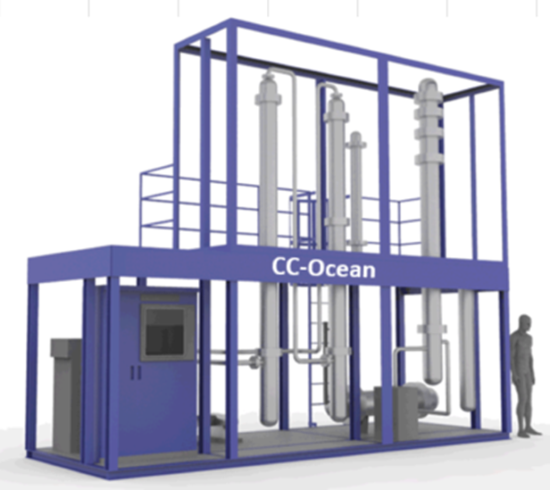August 31, 2020
Kawasaki Kisen Kaisha, Ltd.
Kawasaki Kisen Kaisha, Ltd. (“K” Line) announces it will deploy a small-scale, marine-use demonstration plant for CO2 capture onboard a vessel and conduct research and development on compact facility design, in collaboration with project partners Mitsubishi Shipbuilding Co., Ltd. (“Mitsubishi Shipbuilding”) and non-profit organization Nippon Kaiji Kyokai (“ClassNK”).
The project is supported by the Maritime Bureau of the Ministry of Land, Infrastructure, Transport and Tourism (“MLIT”) as part of its programs to support research and development for advancing marine resources technologies. With the support of MLIT, “K” Line will collaborate with Mitsubishi Shipbuilding and ClassNK to install a small-scale CO2 capture demonstration plant onboard its vessel, conduct test operations of the plant, and measure its performance.
The marine-use CO2 capture demonstration plant will be based on an onshore plant and designed to capture a portion of a vessel’s gas emissions. This project will not only verify the efficacy of capturing and storing CO2 from a vessel’s gas emissions, but also the operability and safety of CO2 capture facilities at sea. These demonstration tests are aimed at promoting the development of more compact equipment required by marine environments along with the development of system requirements necessary for stable continuous operation at sea.
The two-year project will begin in August 2020 with the launch of a HAZID (hazard identification) evaluation of the demonstration plant and deployment on vessels, with verification from ClassNK. Mitsubishi Shipbuilding will begin development and construction of a small-scale CO2 capture demonstration plant and evaluation of system safety. In the middle of 2021, Mitsubishi Shipbuilding will begin test operation of the demonstration plant at its factory, followed by deployment of the plant on “K” Line’s CORONA UTILITY, a thermal coal carrier operated for Tohoku Electric Power Co., Inc. By the end of fiscal 2021, the project partners will start operating the demonstration plant on-board the vessel and measuring the system’s performance under marine conditions, with the aim of jointly developing a new marine system for vessels.
As the world’s first marine demonstration test, the project will provide invaluable insights into facilities design and technologies for capturing CO2 emissions and achieving zero emissions onboard vessels. Additionally, the captured CO2 is expected to be recycled as a new CO2 source for Enhanced Oil Recovery (EOR) processes or as raw material in synthetic fuel through methanation. In this way, the project will significantly contribute to the long-term reduction of greenhouse gas emissions.
Through “CC-Ocean” and other projects, “K” Line is committed to the research, development and deployment of cutting-edge environmental technologies. Through these projects, “K” Line will reduce greenhouse gas emissions, achieve its Environmental Vision 2050, and work on activities for social contribution.

- 拡大
- Small-scale CO2 Capture demonstration Plant(image)
- About logo “CC-Ocean”

Carbon Capture and Storage (CCS) is a emission reduction process by capturing and storing carbon dioxide (CO2) emissions from the use of fossil fuels to prevent carbon dioxide (CO2) from being released into the atmosphere.
The design of the logo is from initials of Carbon Capture on the Ocean and represents
capturing molecular of carbon dioxide inside.
